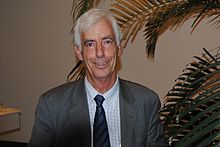Antisemitism or Jew-hatred is hostility to, prejudice towards, or discrimination against, Jews. This sentiment is a form of racism, and a person who harbours it is called an antisemite. Primarily, antisemitic tendencies may be motivated by negative sentiment towards Jews as a people or by negative sentiment towards Jews with regard to Judaism. In the former case, usually presented as racial antisemitism, a person's hostility is driven by the belief that Jews constitute a distinct race with inherent traits or characteristics that are repulsive or inferior to the preferred traits or characteristics within that person's society. In the latter case, known as religious antisemitism, a person's hostility is driven by their religion's perception of Jews and Judaism, typically encompassing doctrines of supersession that expect or demand Jews to turn away from Judaism and submit to the religion presenting itself as Judaism's successor faith—this is a common theme within the other Abrahamic religions. The development of racial and religious antisemitism has historically been encouraged by anti-Judaism, which is distinct from antisemitism itself.

Semitic people or Semites is a term for an ethnic, cultural or racial group associated with people of the Middle East, including Arabs, Jews, Akkadians, and Phoenicians. The terminology is now largely unused outside the grouping "Semitic languages" in linguistics. First used in the 1770s by members of the Göttingen school of history, this biblical terminology for race was derived from Shem (שֵׁם), one of the three sons of Noah in the Book of Genesis, together with the parallel terms Hamites and Japhetites.
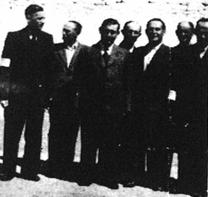
A Judenrat was an administrative body established in German-occupied Europe during World War II which purported to represent a Jewish community in dealings with the Nazi authorities. The Germans required Jews to form Judenräte across the occupied territories at local and sometimes national levels.

Friedrich Wilhelm Adolph Marr was a German journalist and politician, who popularized the term "antisemitism" (1881).
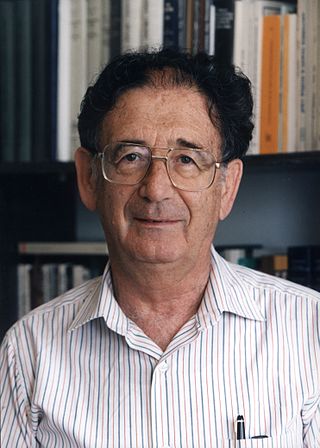
Yehuda Bauer was a Czech-born Israeli historian and scholar of the Holocaust. He was a professor of Holocaust studies at the Avraham Harman Institute of Contemporary Jewry at the Hebrew University of Jerusalem.

Recha Freier born Recha Schweitzer, founded the Youth Aliyah organization in 1933. The organization saved the lives of 7,000 Jewish children by helping them to leave Nazi Germany for Mandatory Palestine before and during the Holocaust.

Saul Friedländer is a Czech-born Jewish historian and a professor emeritus of history at UCLA.

Matthias Küntzel, is a German political scientist and historian. He was an external research associate at the Vidal Sassoon Center for the Study of Antisemitism (SICSA) at the Hebrew University of Jerusalem from 2004 to 2015. Currently, he is a member of the German Council on Foreign Relations DGAP and of the advisory board of UANI.
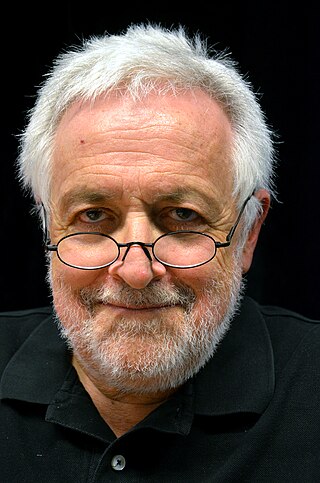
Henryk Marcin Broder, self-designation Henryk Modest Broder, is a Polish-born German journalist, author, and television personality. He was born into a Jewish family in Katowice, Poland.

Joseph Hirsch (Tzvi) Carlebach was a German Orthodox rabbi, natural scientist, and scholar of the history of the Jews in Germany.

Germany–Israel relations are the diplomatic relationship between the Federal Republic of Germany and the State of Israel. After the end of World War II and the Holocaust, relations gradually thawed as West Germany offered to pay reparations to Israel in 1952 and diplomatic relations were officially established in 1965. Nonetheless, a deep mistrust of the German people remained widespread in Israel and the Jewish diaspora communities worldwide for many years after. Relations between East Germany and Israel never materialised. Israel and Germany now maintain a "special relationship" based on shared beliefs, Western values, and a combination of historical perspectives. Among the most important factors in their relations is Nazi Germany's genocide of Jews in Europe during the Holocaust.

Anti-Jewish legislation in pre-war Nazi Germany comprised several laws that segregated the Jews from German society and restricted Jewish people's political, legal and civil rights. Major legislative initiatives included a series of restrictive laws passed in 1933, the Nuremberg Laws of 1935, and a final wave of legislation preceding Germany's entry into World War II.
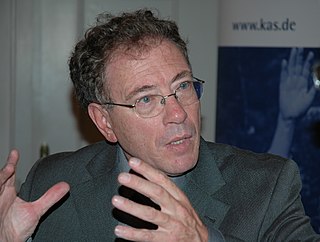
David Witzthum is an Israeli television presenter and editor and lecturer on German history and culture. He is mostly known in Israel as one of the main presenters of the nightly news program MeHayom LeMahar.

Shlomo Shafir (1924–2013), known as Selimar Frenkel until 1948, was an Israeli journalist and historian. His work included the underground Hebrew-language publication Nitzotz, circulated in the Kovno Ghetto and Dachau concentration camp; the Israeli Labor Party newspaper, Davar; and other Hebrew, German, and English language writings.
Gilad Margalit was an Israeli historian, writer, and professor in the Department of General History at the University of Haifa.

Otto Dov Kulka was an Israeli historian, professor emeritus of the Hebrew University of Jerusalem. His primary areas of specialization were the study of modern antisemitism from the early modern age until its manifestation under the National-Socialist regime as the "Final Solution"; Jewish thought in Europe – and Jews in European thought – from the 16th to the 20th century; Jewish-Christian relations in modern Europe; the history of the Jews in Germany; and the study of the Holocaust.
Antisemitism is a growing problem in 21st-century Germany.
Norbert Frei is a German historian. He holds the Chair of Modern and Contemporary History at the University of Jena, Germany, and leads the Jena Center of 20th Century History. Frei's research work investigates how German society came to terms with Nazism and the Third Reich in the aftermath of World War II.
Daniel Blatman is an Israeli historian, specializing in history of the Holocaust. Blatman is the head of the Institute for Contemporary Jewry at the Hebrew University of Jerusalem.

Hubert Isaac Pollack was a German Jew whose clandestine activity prior to the Holocaust enabled him and his associates to save a large number of Jews. After his immigration to Israel, he served in the Haganah and the Israeli Defense Forces.
